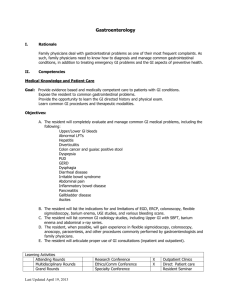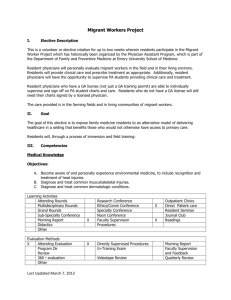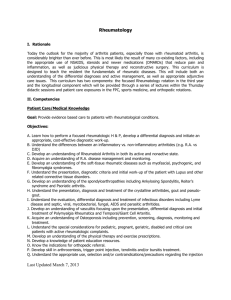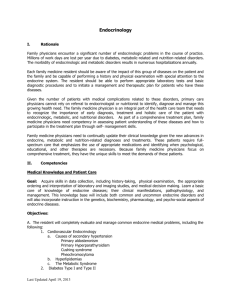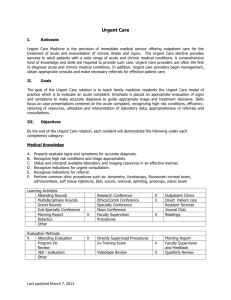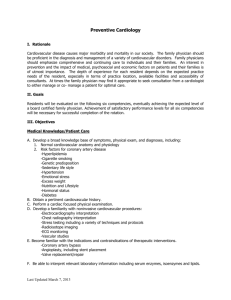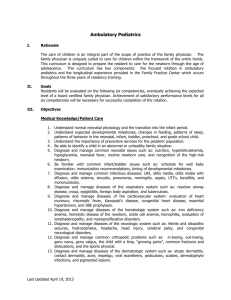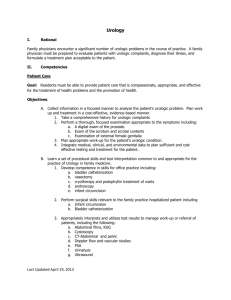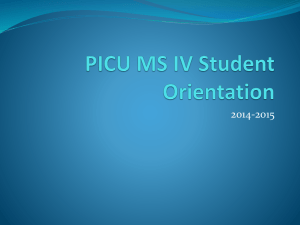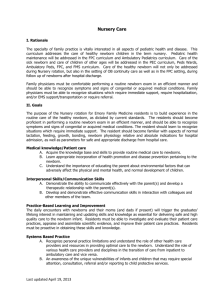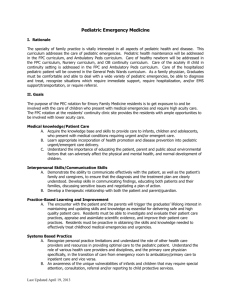GASTROENTEROLOGY - Department of Family & Preventive
advertisement
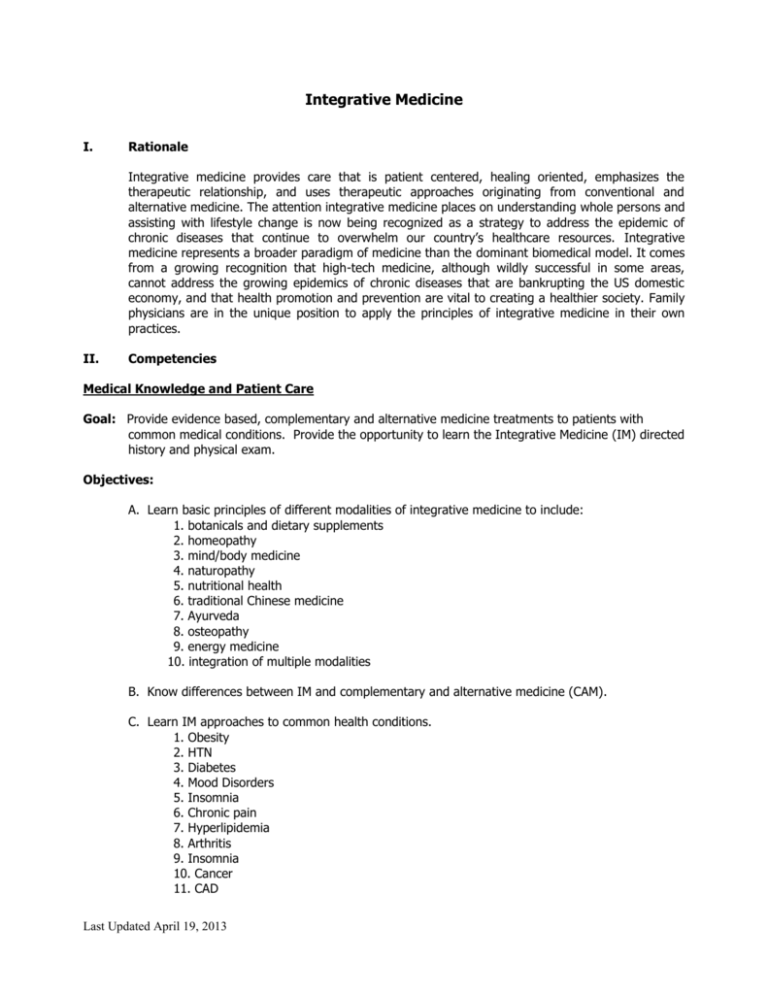
Integrative Medicine I. Rationale Integrative medicine provides care that is patient centered, healing oriented, emphasizes the therapeutic relationship, and uses therapeutic approaches originating from conventional and alternative medicine. The attention integrative medicine places on understanding whole persons and assisting with lifestyle change is now being recognized as a strategy to address the epidemic of chronic diseases that continue to overwhelm our country’s healthcare resources. Integrative medicine represents a broader paradigm of medicine than the dominant biomedical model. It comes from a growing recognition that high-tech medicine, although wildly successful in some areas, cannot address the growing epidemics of chronic diseases that are bankrupting the US domestic economy, and that health promotion and prevention are vital to creating a healthier society. Family physicians are in the unique position to apply the principles of integrative medicine in their own practices. II. Competencies Medical Knowledge and Patient Care Goal: Provide evidence based, complementary and alternative medicine treatments to patients with common medical conditions. Provide the opportunity to learn the Integrative Medicine (IM) directed history and physical exam. Objectives: A. Learn basic principles of different modalities of integrative medicine to include: 1. botanicals and dietary supplements 2. homeopathy 3. mind/body medicine 4. naturopathy 5. nutritional health 6. traditional Chinese medicine 7. Ayurveda 8. osteopathy 9. energy medicine 10. integration of multiple modalities B. Know differences between IM and complementary and alternative medicine (CAM). C. Learn IM approaches to common health conditions. 1. Obesity 2. HTN 3. Diabetes 4. Mood Disorders 5. Insomnia 6. Chronic pain 7. Hyperlipidemia 8. Arthritis 9. Insomnia 10. Cancer 11. CAD Last Updated April 19, 2013 12. 13. 14. 15. 16. 17. 18. 19. 20. Dementia URI Chronic fatigue Fibromyalgia Constipation Women's health Gut dysbiosis Nutritional deficiencies Food sensitivities and allergies D. Focus on personal growth and reflection. Learning Activities Attending Rounds Multidisciplinary Rounds Grand Rounds Sub-Specialty Conference Morning Report X Didactics Other Evaluation Methods X Attending Evaluation X Program Director Review 360 ᵒ evaluation Other X X X Research Conference Ethics/Comm Conference Specialty Conference Noon Conference Faculty Supervision Procedures X X X Directly Supervised Procedures In-Training Exam X Videotape Review X Outpatient Clinics Direct Patient care Resident Seminar Journal Club Readings Morning Report Faculty Supervision and Feedback Quarterly Review Interpersonal and Communication Skills Goal: Residents will develop and demonstrate effective information exchange and teaming with patients, their families and other health professionals. Objectives: A. Develop skills for interviewing patients that allow accurate, complete collection of information regarding symptoms, and the community environment that affect the patients gastrointestinal health. B. Develop skills in communicating results, educating patients and their families, and dealing with sensitive issues for patients and families, and negotiating a plan of treatment with the patient and family. C. Residents will understand the need for a multidisciplinary, integrated approach to common medical conditions. See above D. Develop patient sensitive skills for interviewing that allow accurate and complete collection of information regarding symptoms, the family and the community that affect the patient's health and care. E. Develop skills in communicating results to patients, their families, other health care providers. F. Develop skills in educating patients and their families, in dealing with sensitive issues for patients and families, and in negotiating a plan of investigation and treatment with the patient and family. G. Develop professional relationships with co-workers, consultants, ancillary staff and other Last Updated April 19, 2013 professionals to enable assembling of health care teams and mobilization of community resources to optimize care of the patient. H. Develop an understanding of the role of the family medicine consultant, and is able to support the patient through the process of consultation, medical evaluation, treatment, rehabilitation and long-term care. J. Use professional language and demeanor when communicating with other residents, with Family Medicine attending physicians, with physicians from other services, with nonphysician clinical staff, with non-physician non-clinical staff, and with patients and their families. K. Create and sustain a therapeutic and ethically sound relationship with patients. L. Use effective listening skills and elicit and provide information using effective nonverbal, explanatory, questioning, and writing skills. M. Work effectively with others as a member or leader of a health care team or other professional group. N. Learn how to effectively and efficiently communicate and coordinate with IM consultants. Learning Activities Attending Rounds Multidisciplinary Rounds Grand Rounds Sub-Specialty Conference Morning Report X Didactics Other Evaluation Methods X Attending Evaluation X Program Director Review 360 ᵒ evaluation Other X X X Research Conference Ethics/Comm Conference Specialty Conference Noon Conference Faculty Supervision Procedures X X X Directly Supervised Procedures In-Training Exam X Videotape Review X Outpatient Clinics Direct Patient care Resident Seminar Journal Club Readings Morning Report Faculty Supervision and Feedback Quarterly Review Systems-Based Practice Goal: Demonstrate an awareness of and responsiveness to the larger context and system for health care and the ability to effectively call on system resources to provide care that is of optimal value. Objectives: A. Understand how their patient care and other professional practices affect other health care professionals, the health care organization, and the larger society and how these elements of the system affect their own practice. B. Know how types of medical practice and delivery systems differ from one another, including methods of controlling health care costs and allocating resources. C. Practice cost-effective health care and resource allocation that does not compromise quality of care. D. Advocate for quality patient care and assist patients in dealing with system complexities. E. Know how to partner with health care managers and health care providers to assess, coordinate, and improve health care and know how these activities can affect system performance. Last Updated April 19, 2013 Learning Activities Attending Rounds Multidisciplinary Rounds Grand Rounds Sub-Specialty Conference Morning Report X Didactics Other Evaluation Methods X Attending Evaluation X Program Director Review 360 ᵒ evaluation Other X X Research Conference Ethics/Comm Conference Specialty Conference Noon Conference Faculty Supervision Procedures X X X X Directly Supervised Procedures In-Training Exam X Videotape Review X X Outpatient Clinics Direct Patient care Resident Seminar Journal Club Readings Morning Report Faculty Supervision and Feedback Quarterly Review Professionalism Goal: Residents will demonstrate a commitment to carrying out professional responsibilities, adherence to ethical principles, and sensitivity to a diverse patient population. Objectives: A. Understand the need for continuing medical education to stay abreast of the ever advancing field of integrative medicine. B. Become familiar with IM resources available in the community for patients with chronic illness and learn how to incorporate them into the treatment plan when needed. C. Demonstrate integrity, honesty, respect and a commitment to excellence in all activities. D. Demonstrate sensitivity, respect and adapt appropriately to the social and cultural issues of each patient. E. Display initiative and resourcefulness in patient care and in solving problems. F. Be timely in attendance of activities and completion of tasks. G. Demonstrate respect, compassion, and integrity; a responsiveness to the needs of patients and society that supersedes self-interest; accountability to patients, society, and the profession; and a commitment to excellence and on-going professional development. H. Demonstrate a commitment to ethical principles pertaining to provision or withholding of clinical care, confidentiality of patient information, informed consent, and business practices. I. Arrive at the rotation in a timely fashion. J. Work effectively as a member of a team. K. Respect patient privacy by guarding medical records and discussion of personal information L. about patients. M. Assist patients and their families in planning for future care needs and care decisions based on prognosis for the disease. N. Support the patient in their healthcare decisions. O. Demonstrate professional, respectful demeanor when addressing team members, patients, ancillary staff, and consultants. P. Appear professionally dressed and well groomed Q. Attends required conferences. Last Updated April 19, 2013 Learning Activities Attending Rounds Multidisciplinary Rounds Grand Rounds Sub-Specialty Conference Morning Report X Didactics Other Evaluation Methods X Attending Evaluation X Program Director Review 360 ᵒ evaluation Other X X Research Conference Ethics/Comm Conference Specialty Conference Noon Conference Faculty Supervision Procedures X X X X Directly Supervised Procedures In-Training Exam X Videotape Review X X Outpatient Clinics Direct Patient care Resident Seminar Journal Club Readings Morning Report Faculty Supervision and Feedback Quarterly Review Practice-based Learning and Improvement Goal: The resident should develop skills in evaluating their own patient care, appraising and assimilation of scientific evidence to improve patient care. Objectives: A. Analyze practice experience and perform practice-based improvement activities using a systematic methodology. B. Locate, appraise, and assimilate evidence from scientific studies related to their patients' health problems. C. Obtain and use information about their own population of patients and the larger population from which their patients are drawn. D. Apply knowledge of study designs and statistical methods to the appraisal of clinical studies and other information on diagnostic and therapeutic effectiveness. E. Use information technology to manage information, access on-line medical information; and support their own education. F. Learn to incorporate health promotion and disease prevention into patient care. G. Use evidence-based integrative medicine, evaluation of available evidence, and use of bestevidence during routine clinical care. Learning Activities Attending Rounds Multidisciplinary Rounds Grand Rounds Sub-Specialty Conference Morning Report X Didactics Other Evaluation Methods X Attending Evaluation X Program Director Review Last Updated April 19, 2013 X X X Research Conference Ethics/Comm Conference Specialty Conference Noon Conference Faculty Supervision Procedures Directly Supervised Procedures In-Training Exam X X X X Outpatient Clinics Direct Patient care Resident Seminar Journal Club Readings Morning Report Faculty Supervision and Feedback 360 ᵒ evaluation Other III. Videotape Review X Quarterly Review Instructional Strategies (see above) The primary strategy will be precepted patient care and procedures on the Integrative Medicine rotation and in the Family Medicine Clinic. This will be complemented by didactic presentations and supplemental readings provided by the IM preceptor. IV. Evaluation Strategies (see above) A. B. C. D. E. F. Direct observation by Integrative Medicine and Family Practice preceptors Chart review Procedure documentation and procedure-specific evaluation forms. End of rotation summative evaluation by IM preceptor Resident evaluation of rotation by evaluation form. Resident-advisor meetings (before and after rotation). At the midpoint of each rotation (as a minimum) and as frequently as possible throughout, the resident should be given specific and constructive feedback by the IM preceptor on his/her progress, to include recommendations for improvement and personal growth. G. If the resident does not receive this midpoint 2 week evaluation, he/she should request it from his/her staff preceptor. H. ABFP in-training exam I. Resident self-evaluation J. Resident must read AAFP Monograph # 293 and complete pre- and post-tests. V. Implementation Strategies A. This is a PGY II/PGY III elective rotation. The rotation will be done in the clinic of Dr. Tasneem Bhatia. B. PGY II residents will spend 6 half days/week for 1 four week block in the IM clinic and 4 half days/week in the Family Medicine Clinic. PGY III residents will spend 5 half days/week and 5 half days/week in the Family Medicine Clinic. C. 1 week of vacation is allowed during the IM rotation. D. Location: Atlanta Center for Holistic and Integrative Medicine, 2556 Apple Valley Rd, Suite 175, Atlanta GA 30319 E. Contact: 404-814-9808 F. Resident responsibilities: 1. Meet with IM advisor and know the IM rotation expectations. 2. Examine patients, formulate an initial plan for work-up, diagnosis and management, and then present the patients to the preceptor. 3. Call will take place on the Family Medicine Service at Emory University Hospital Midtown. 4. Spend 4 half-days per week in FPC. 5. Document all procedures and diagnoses of patients managed. 6. Actively seek feedback from preceptors. 7. Complete rotation evaluation at the end of rotation. Last Updated April 19, 2013 VI. Selected Resources/Readings http://www.uptodate.com/contents/overview-of-herbal-medicine-and-dietarysupplements?source=search_result&search=integrative+medicine&selectedTitle=4~150 http://integrativemedicine.arizona.edu/education/online_courses/enviro-med.html (Environmental Medicine Online Course) Am J Cardiol. 2013 Feb 1;111(3):339-45. doi: 10.1016/j.amjcard.2012.10.010. Epub 2012 Nov 24. Use of complementary therapies in cardiovascular disease. Curr Diab Rep. 2012 Dec;12(6):749-61. doi: 10.1007/s11892-012-0315-2. Complementary and alternative medicine in diabetes care. Patient Educ Couns. 2012 Dec;89(3):417-22. doi: 10.1016/j.pec.2012.08.013. Epub 2012 Sep 30. Integration of complementary and alternative medicine in primary care: what do patients want? http://nccam.nih.gov/news/camstats/2007. 2007 Statistics on CAM Use in the United States AFP Monographs: Complementary and Alternative Medicine (#293) 2003 Last Updated April 19, 2013
